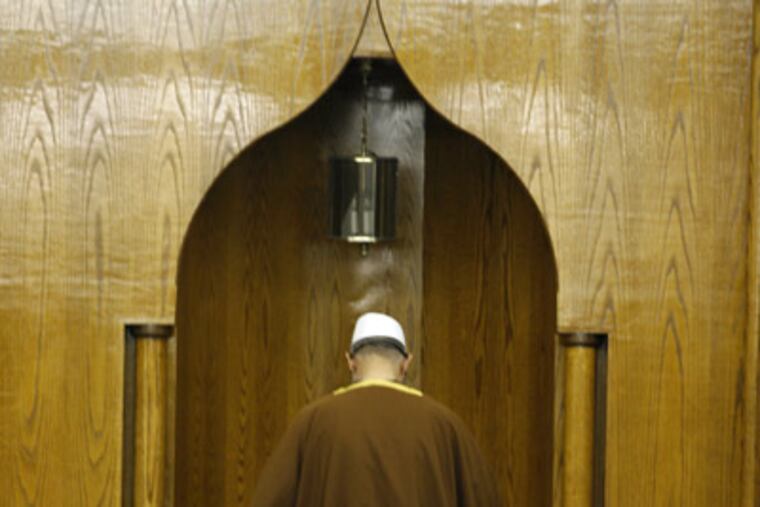Sharia law as bogeyman
Osama bin Laden is dead, al-Qaeda is reeling, Middle East dictators are deposed seemingly every other Tuesday, and yet, in the fevered and delirious minds of far too many of our elected leaders, the United States is forever on the verge of becoming just another province in the ever-expanding Muslim caliphate.

Osama bin Laden is dead, al-Qaeda is reeling, Middle East dictators are deposed seemingly every other Tuesday, and yet, in the fevered and delirious minds of far too many of our elected leaders, the United States is forever on the verge of becoming just another province in the ever-expanding Muslim caliphate.
Never mind that the last actual caliph lost that title back in 1922, when the Ottoman Empire dissolved. Or that most estimates put the Muslim population of the United States at less than 1 percent. For those determined to live in fear of Muslims, those facts are irrelevant, and the only thing preventing the United States of America's Western character from being utterly overwhelmed by Islam is eternal vigilance.
Just ask Newt Gingrich, whose two-week run atop the Republican presidential field seems to be nearing a predictable and merciful end. Last year, he described sharia law - the moral and religious law of Islam - as a "mortal threat to the survival of freedom in the United States."
We've come to expect that kind of hysteria from Gingrich. But he's hardly alone. Increasingly, sharia law is becoming a mainstream bogeyman. Since 2009, more than two dozen states have considered legislation to ban state judges from considering sharia law in their rulings.
Now, Pennsylvania is among them. In November, State Rep. RoseMarie Swanger (R., Lebanon) introduced House Bill 2029, which says that state tribunals "shall not consider a foreign legal code or system" in their deliberations.
Swanger's bill - which has at least 42 cosponsors - does not explicitly mention sharia law, but it might as well. Back in June, before the bill was introduced, a memo with Swanger's signature was circulated among members. It called sharia law "inherently hostile to our constitutional liberties" and "a violation of the principles on which our nation was founded."
Swanger says the memo was written by committee staff and published under her name in error. She has since released a second legislative memo that does not explicitly single out Sharia law. But she doesn't deny that sharia is what has her and her colleagues spooked.
"I am concerned about women's rights. Everyone knows under sharia law, women don't have rights. They're property," Swanger said.
That's not entirely true, but I get her point. The sort of sharia law practiced by the Taliban in prewar Afghanistan is utterly abhorrent. And there's no room in American culture or courts for the strict sharia law that governs, say, Saudi Arabia.
But these comparisons are next to useless for a few reasons. For one, sharia law isn't a monolith, nor is it just a legal code. For many Muslims, particularly in the United States, sharia is primarily considered a set of moral principles, not legal ones. Second, there are some instances where it may make sense to consider sharia customs. For instance, a practicing Muslim might wish to have his assets divided after his death according to sharia tradition. Are you really prepared to deny him the right to choose his heirs as he pleases simply because sharia is a scary word for some Westerners?
Interestingly, a number of Jewish groups have opposed the anti-sharia movements almost as vocally as Muslim organizations, largely out of fear that the legislation could infringe on the use of Halakha, Jewish religious law, which some Jews have used to settle disputes in the United States through arbitration.
The biggest reason, though, to reject the anti-sharia movement is that it is built on a foundation of fear and prejudice, and not on evidence that courts in the United States are being subverted by foreign legal theories.
There are two cases (two!) that the sharia fearmongers most often cite when they talk about creeping Islamization of the American justice system. One was a Florida case involving a dispute between current and former trustees of a Tampa Bay mosque, in which the judge had said he would try the case under "ecclesiastical Islamic Law." That same judge reversed himself last week and dismissed the case.
Also cited is a New Jersey ruling from 2010 in which a judge denied a restraining order for a woman who said she had been repeatedly raped and assaulted by her husband. The judge found that the husband believed his wife must submit to his sexual demands under Islamic law, and thus lacked criminal intent.
That's reprehensible. And guess what? The decision was reversed on appeal, which is exactly what's supposed to happen when judges get it wrong. But for the anti-Islam warriors among us, these two cases, plucked from the untold tens of thousands tried in American courts each year, somehow warrant a national assault on sharia. All in the name of the separation of religion and state, of course.
One wonders if these Western warriors will still have enough time left over after beating back the sharia menace to devote their usual energy to the War for Christmas. We can only hope. After all, somebody has to go the mat for the right to put the Nativity scene on public land.